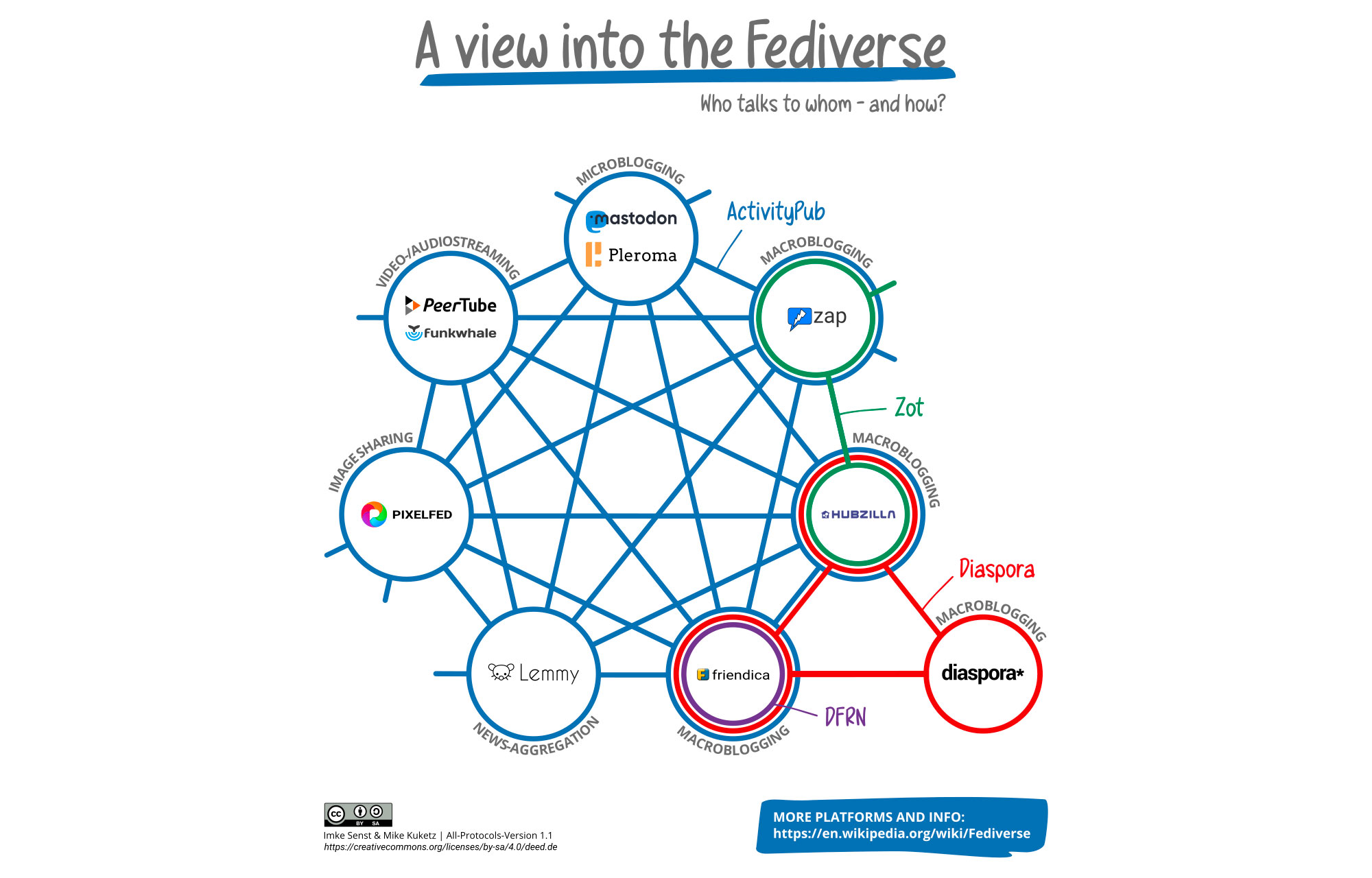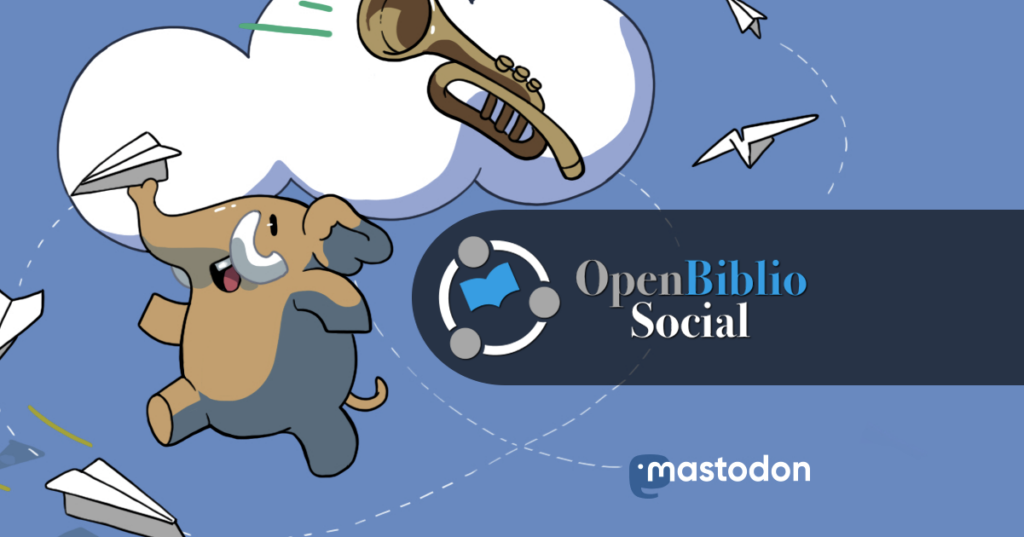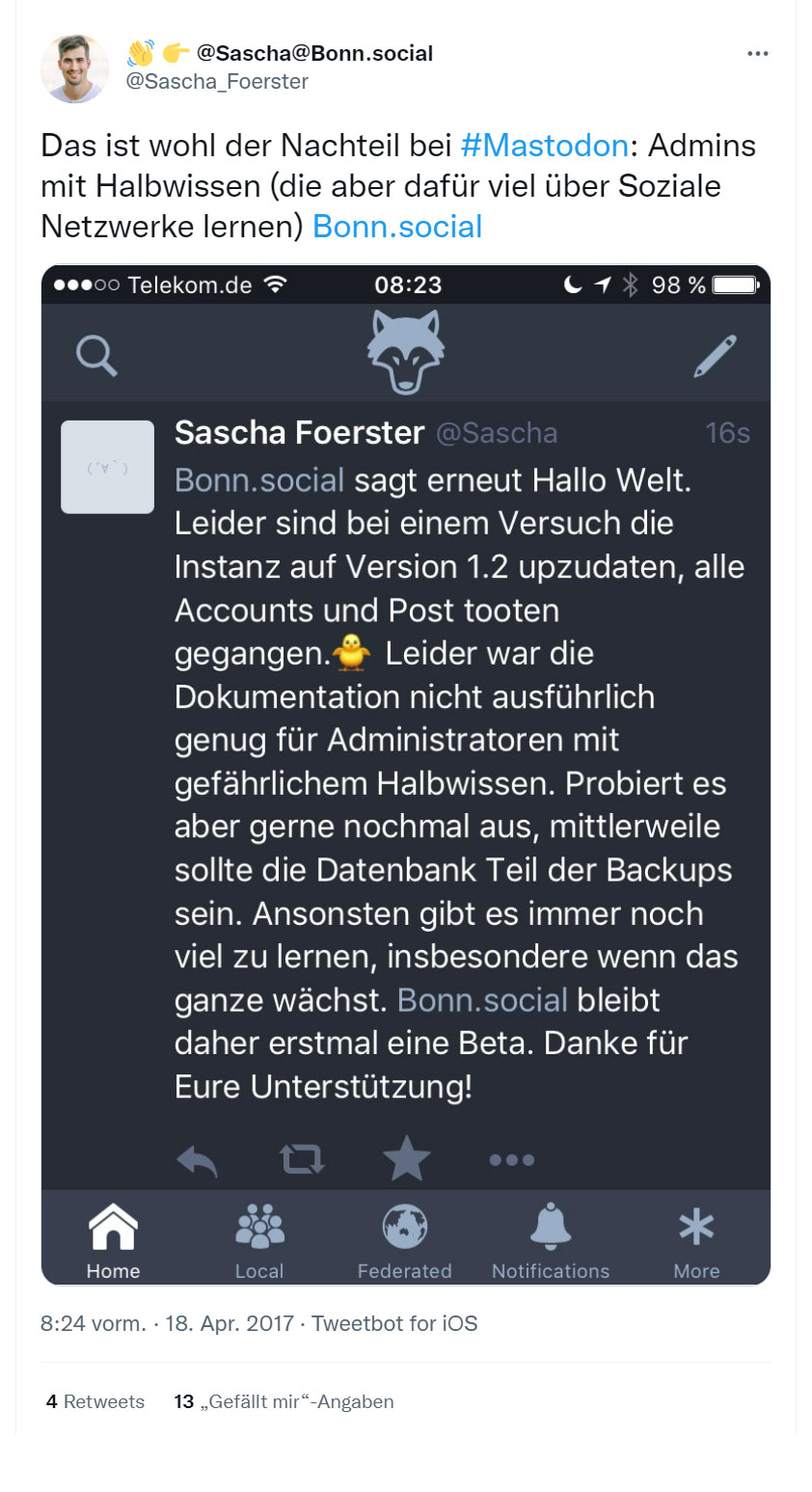
Self-organised network: does Mastodon have what it takes to become the “scholarly-owned social network”?
A “scholarly-owned social network” as an alternative to the major commercial players sounds like the promised land in a science environment that is becoming increasingly more open, transparent and independent. But a few things need to happen for this to become reality.
by ZBW MediaTalk-Team
Ever since Elon Musk, holding a sink in his arms (“Let that sink in!”), entered the Twitter headquarters in San Francisco at the end of October, a sense of dark foreboding has been spreading in the online world. The richest man in the world had orchestrated a hostile takeover of the short message service: It is rumoured to have cost him 44 billion US dollars to turn his hobby into a new enterprise, which he can add to his business empire (Tesla, SpaceX, SolarCity, Neuralink and others).
The billionaire had previously assured the world that he is a “free speech absolutist”. His plan was now to make Twitter into a place of uncensored freedom of speech. Those who were sanctioned and blocked for violating the community rules, would sooner or later receive a general absolution and be able to return to the platform. Even Donald Trump – former president of the United States and co-instigator of the most spectacular attempted coup in the USA to date – would have the red carpet rolled out for him.
Toxicity 2.0
Now Twitter has never been a cosy refuge of mutual understanding, consideration and the cultured exchange of arguments. Twitter has polarised opinions for years. But as the increase in social division has continued, particularly in the west, hate and toxicity have been constantly increasing on the platform. They are expressed in threats, open racism, discrimination, fake news, doxing and cyber-bullying. More than a few German politicians have therefore recently pulled the plug and turned their backs on the network.
How Twitter will develop in future years is anyone’s guess. However, on the evidence of the few days since Elon Musk has been at the helm, it doesn’t look good. The new CEO appears to be nervously driven, almost erratic. His first act after taking the wheel was to fire the moderating powers within the company, thereupon to bark contradictory commands to the remaining workforce. In the meantime, Twitter Inc. has neither a press department nor a data protection officer, causing the data protection officers of German companies and organisations to break out in a collective sweat, because the operation of Twitter accounts under consideration of GDPR aspects can only be legally justified with a great deal of good will.
Fear of loss of reach
Ministries, authorities but also the science sector is now facing a dilemma. There is a strong moral obligation to pack up, shut down the account that you have been nurturing and maintaining for many years and bid farewell, softly but firmly, to Twitter. On the other hand, there is an understandable fear of loss of reach: How can politics stay in touch with the public? How can universities, museums and libraries fulfil their public mandate if, at the same time, they leave their online communities?

Wikipedia, CC BY-SA 4.0
It is questions like these that, since the dimming of Twitter, have led to one name in particular being floated around: “Mastodon”. At the moment it’s individuals in particular, who are looking for a new home – and the short messaging service alternative seems to have a certain appeal to members of the science community especially.
Much has been written in recent days about this actually not-so-very-new platform. Started in 2016 by German software developer Eugen Rochko, it is a distributed micro-blogging service that lies completely in the hands of the community, thanks to its open source code. In contrast to Twitter, Mastodon is not a centrally organised entity but a network that is created from hubs “instances”. Every instance can function autonomously or alternatively stretch its arms out to the big network where it then becomes part of the large Fediverses that is home these days not only to social networks but also to video streaming services, image sharing services and the like. Theoretically, every imaginable service and every kind of content can be added to the Fediverse using compatible open source communication protocols – the possibilities are boundless!
Theoretically, at least.
Crisis as chance
Although the developments regarding the Twitter takeover are to be evaluated critically, they were – at the same time – a collective wake-up call for openness in the digital sphere. The idea of decentralised systems that are in the hands of the communities – such as for scientific exchange and scholarly communication – is closely aligned to the wish of many people for more openness in science. There is no gatekeeper; there are no paywalls, no evolved, incomprehensible hierarchies; just the self-organisation of the community.
ZBW MediaTalk succumbed to the charm of Mastodon at a quite early stage. In 2019 we set up the account for the blog; a few months ago we really got going and since then we have been posting content regularly from the library and Open Science world.
And it’s working.
But after several months of operation, maybe it’s time to do a stocktake – not a performance evaluation, though; it’s definitely too early for that. But a summary of the experiences we have made to date. Because naturally even this much lauded network (perhaps occasionally praised with too much uncritical euphoria) is not entirely free of problems. Let’s refer to them as unusually deep puddles that lurk out of sight, and that Mastodon newbies can easily put their feet into. Because they do exist.
 At that time we decided to create our account on the Openbiblio Instance. Purely theoretically though, we could have decided to use any one of the dozens of official and even hundreds of unofficial instances. Or to operate our own server. So why Openbiblio? This instance has been operated by the Berlin State Library (SBB) since 2019, and we therefore know the team behind it. There is a data protection statement, server rules and thanks to the maintenance by the SBB IT department, one can assume that the accessibility of the server is relatively reliable. All this is not necessarily a matter of course. As a result of its decentralised nature, Mastodon and the Fediverse in general have been born with structural weaknesses that have still not been ironed out.
At that time we decided to create our account on the Openbiblio Instance. Purely theoretically though, we could have decided to use any one of the dozens of official and even hundreds of unofficial instances. Or to operate our own server. So why Openbiblio? This instance has been operated by the Berlin State Library (SBB) since 2019, and we therefore know the team behind it. There is a data protection statement, server rules and thanks to the maintenance by the SBB IT department, one can assume that the accessibility of the server is relatively reliable. All this is not necessarily a matter of course. As a result of its decentralised nature, Mastodon and the Fediverse in general have been born with structural weaknesses that have still not been ironed out.
Three critical points
1. Data protection
Firstly the topic of data protection. Unlike commercial platforms that track, log and process the behaviour of their users down to the smallest detail in order to sell targeted advertising, Mastodon instances are exempt from such blanket data collection frenzy. Is data protection therefore automatically guaranteed in the Fediverse? Not at all. With one click, the administrator has an overview of everything at all times: on Mastodon, posts and messages are not even end-to-end encrypted, which is why most instances today pre-emptively warn that if someone wants to send a DM, “don’t share any sensitive information on Mastodon!” And the way in which private user data is protected from the eyes of third parties is also left to the discretion of each administrator. With some servers, there is no mention of a contact person for data protection issues; others completely neglected to provide a privacy policy worth mentioning at all.
2. Data security
Next keyword: data security. This too depends completely on the knowhow and commitment of the server administrator. It doesn’t take much to bring a Mastodon instance to life. But it doesn’t take much to destroy it again either. The founder of the Social.Bonn server found this out in the year 2017. When trying to install an update on his instance, the whole system crashed: all postings and all the accounts that had been previously set up were irretrievably lost. There was no backup.
Do the administrators of the chosen instance handle it with care? Do they install critical fixes to the code in a timely manner? Do they even install updates at all? Can they guarantee regular data security? From the outside, these questions can almost never be answered, which means that choosing an instance is reduced to a game of chance. The hint that you can change your instance at any time is no help here, because when would be the right time to do this? However much the world mistrusts the major commercial platforms: no-one seriously worries about a complete loss of data there.
3. Moderation
A third point of criticism concerns the climate – the social discourse on the platform. How can it be ensured that the instance is a place of civilised discourse? Mastodon is by default equipped with features that allow the members to report offensive or criminal content. But how and whether the administrators react to the reports is initially left solely up to them. The Fediverse does not have a common canon of values for content evaluation; there are no generally-valid community guidelines and no overriding committee that members can call on for clarity if no action is taken or suspicions are false. What mobbing is, what fake news is, where offensiveness stops and open hatred begins – all this is decided by the administrators of the respective server, initially under their own steam. Sometimes their rules are laid down specifically; sometimes not. Factors such as the size of an instance and the resources available can also make content moderation more difficult. The large commercial networks rely on artificial intelligence and outsourced moderation teams to fish out evil, dirty and forbidden content from the timelines. How can just one person take on this task round the clock if they are maintaining an instance with thousands of members? And the issue of toxicity is only one element of the supervision: we haven’t even mentioned how copyright-protected content is handled (German).
Cooperation is now called for
Data protection, data security and moderation – these are the three critical weak points that you need to bear in mind with Mastodon, when choosing an instance. There is always only an approximation of security (and at this point, thanks again to the SBB in Berlin), but no guarantees. If you want to play it safe, you logically have to rely on self-hosted instances.
Operating your own instances as an alternative to using the services of the major commercial players sounds like the promised land in a science environment that is becoming increasingly more open, transparent and independent. This is also true in the light of current efforts to have the operation of Open Science infrastructures completely in the hands of scientific communities (scholarly-owned) or at least under their control /scholarly-led). But in order for this plan to become a reality, institutions must cooperate more closely, come to agreements, and develop a common vision of what such a network could look like and the values it could reflect. And the time is now. Consolidation, clear responsibilities and transparency are required to minimise the three structural weak points. One idea could be to establish a consortium, within which several scientific institutions can join forces, either on an institutional or target group-specific basis, in order to jointly operate an instance that is secure for everyone. The fact that Mastodon is an open source project means that there is even the opportunity to actively push the development of the network forward or promote it in another way.
Alternatively or additionally, the development of a certification process is a possibility for existing and new instances such as those in the scientific sector. A joint criteria catalogue has been defined for this purpose – compliance with it offers registered users a certain degree of security. Are there specific contact persons? Is data protection maintained? Are data pools backed up regularly? Does moderation take place, and if yes, on the basis of which rules? If there was simply a seal, a formal certification, then outsiders would have many of their questions answered. Even today, timid attempts at an initial regulation have been made: For example, the official Mastodon website currently only lists those servers, who fulfil certain criteria, although this tends to concern merely rudimentary rules.
These are just a few suggestions. There are sure to be a few clever ideas out there on this topic that could help to make Mastodon a viable alternative to Twitter – or much more, perhaps. One thing is certain: the momentum to start thinking about it has arrived right now.
You may also be interested in:
- Briefly Noted: ZBW MediaTalk in Test Mode on Mastodon
- Social Media in Libraries: Best Practice and Tips for Successful Profiles From the Bayerische Staatsbibliothek
- Libraries on Twitch: Ideas for Starting on the Streaming Platform
- Why Libraries Have to be Permanently Active on Social Media: 7 “Glorious” Reasons – 2021 Update
Featured Image: Wikipedia, Creative Commons Attribution-ShareAlike 4.0.
View Comments

Digital Long-term Archiving: Discovering Networks With the nestor Community Survey
nestor, the competence network for digital long-term archiving, recently conducted a...





